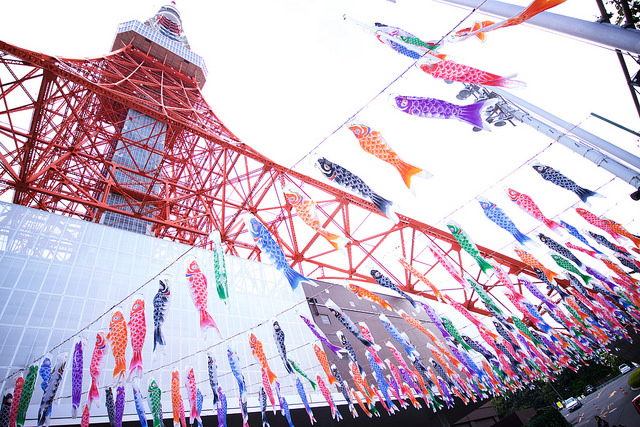Apr 18, 2019
What is Golden Week?
Japan is a nation that famously takes their working week very seriously. Hours are often long and hard and, as paid vacation is relatively limited when compared to many western countries, the decision to take time off is not taken lightly. This goes a long way to explain why Golden Week is so fervently celebrated in Japan.
Golden Week straddles the spring months, from April 29 to May 5, and is marked by four national holidays. As such, many Japanese take the opportunity to take the whole week off work, supplementing the non-sanctioned days with their precious paid vacation, although many businesses shut down operations entirely, giving their employees, with weekends taken into consideration, up to ten days of rest.
Not surprisingly, many people see this time as an excellent chance to get away for the week, meaning that travel and accommodation tend to come at a high price and, if you are not a tourist taken to great forward planning, you may end up paying through the nose or even miss out entirely.
In 2019, the Emperor of Japan will abdicate his position on April 30, paving the way for a new emperor to take over on May 1 which will be made a national holiday. This change means that April 30 and May 2 will also become national holidays (yay!), creating a 10-day long holiday period from April 27 to May 6.
Other than a great chance to escape the office, what is Golden Week all about? Well, it is, in actuality, much more than an excuse to go on a trip or visit the movies.
Showa Day, April 29
 Showa Day on April 29 had originally been called Emperor’s day as it falls on the birthday of Hirohito, the Showa Emperor. Hirohito is something of a controversial figure in Japan as his reign – from 1926 to 1989 –spanned a particularly turbulent time in Japan’s modern history, and rather than being seen as a celebration of Hirohito’s life, it is meant as a day of reflection on those difficult times.
Showa Day on April 29 had originally been called Emperor’s day as it falls on the birthday of Hirohito, the Showa Emperor. Hirohito is something of a controversial figure in Japan as his reign – from 1926 to 1989 –spanned a particularly turbulent time in Japan’s modern history, and rather than being seen as a celebration of Hirohito’s life, it is meant as a day of reflection on those difficult times.
Constitutional Memorial Day, May 3
 The 3rd of May is Constitutional Memorial Day, a day which is set aside to recognize the coming into effect of the current Japanese constitution on this day in 1947. However, many people, journalists, and newscasters, in particular, see it as a time to reflect on the nature of democracy and the current state of Japanese politics as a whole.
The 3rd of May is Constitutional Memorial Day, a day which is set aside to recognize the coming into effect of the current Japanese constitution on this day in 1947. However, many people, journalists, and newscasters, in particular, see it as a time to reflect on the nature of democracy and the current state of Japanese politics as a whole.
Greenery Day, May 4
May 4 is perhaps the most complicated of the Golden week holidays. In 1989, with  the passing of Hirohito, the Emperor’s birthday holiday switched to December 23 to celebrate the new Reigning Emperor Akihito. Loth to relinquish the precious opening day of Golden Week, April 29 was renamed Greenery Day, acknowledging Hirohito’s love for flora, whilst avoiding accrediting him directly. Then, in 2005, following the revision of Japanese holiday law, Showa day was instated and Greenery day moved to May 4* to become a time, as the name references, for Japanese to ponder upon and commune with nature.
the passing of Hirohito, the Emperor’s birthday holiday switched to December 23 to celebrate the new Reigning Emperor Akihito. Loth to relinquish the precious opening day of Golden Week, April 29 was renamed Greenery Day, acknowledging Hirohito’s love for flora, whilst avoiding accrediting him directly. Then, in 2005, following the revision of Japanese holiday law, Showa day was instated and Greenery day moved to May 4* to become a time, as the name references, for Japanese to ponder upon and commune with nature.
Children’s Day, May 5
 The final bookend of Golden Week is Children’s Day on May 5. This holiday is thought to have origins in the early 7th century and was traditionally known as Boy’s Day. Up to this day families will display brightly colored carp-shaped, koinobori flags (resembling and functioning in a way similar to wind socks) outside their homes, one for each boy in the household (though since the holiday was renamed Children’s Day many families fly one koinobori per child).
The final bookend of Golden Week is Children’s Day on May 5. This holiday is thought to have origins in the early 7th century and was traditionally known as Boy’s Day. Up to this day families will display brightly colored carp-shaped, koinobori flags (resembling and functioning in a way similar to wind socks) outside their homes, one for each boy in the household (though since the holiday was renamed Children’s Day many families fly one koinobori per child).
The carp is a reference to the Chinese legend of the great fish swimming upstream to become a dragon, representative of a boy’s struggle and ultimate success in attaining manhood, and thus greatness.
By Mark Guthrie
Photo Koinobori 20170428” (CC BY-NC-ND 2.0) by hatake_s
Photo: See page for photographer[Public domain], via Wikimedia Commons -Modified
Photo: By The government of Japan [Public domain], via Wikimedia Commons-Modified


About the author